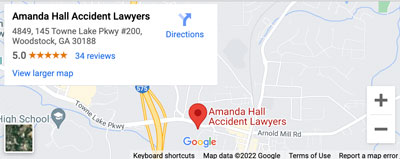Georgia’s “At Fault” Law Explained
A slam on the brakes, screeching from the pavement, and then a crash. Nobody wakes up anticipating their involvement in an automobile accident, but that doesn’t stop more than 1,720 collisions from happening every single day in the state of Georgia, alone. After an accident happens, no matter how minor, both drivers will want to know who is at fault and financially culpable for the damages.
In Georgia, finding this answer isn’t quite as easy as you might think. Let’s break down Georgia’s “At Fault” law in a few simple steps.
Understanding Modified Comparative Negligence
Each state will have its own comprehensive legislation relating to insurance. In Georgia, insurance companies will estimate the accident liability of each person involved by assigning a percentage of the blame. If one individual is considered more than 50% liable for the incident, they will not be able to claim any damages. On the flip side of the coin, individuals up to 49% liable can file for damages.
Georgia law dictates that there can be three outcomes of an automobile accident: one driver is at fault, both drivers are equally at fault, or one driver is only partially responsible.
Other effects of Modified Comparative Negligence
- Insurance companies are incentivized to evaluate every single detail of the accident report. Including the following:
- Police Reports
- Forensic Crash Analysis
- Interviewing All Parties
- Drivers should consider legal representation when talking with their insurance company.
- Anyone up to 49% responsible can receive compensation.
Liability Percentage and Compensation Results
Thanks to Georgia’s Modified Comparative Negligence legislation, filing a claim can leave claimants in relatively dire straits. Assigning liability will have an impact on the amount receivable. A driver 49% liable for the incident will receive just 51% of their total damages.
While it is important to have this information available, it won’t change what a responding officer writes during their initial report. Every responding officer will assign fault to one or both parties, typically with a citation. This citation can have a dramatic impact on the eventual claim that a driver makes for damages, no matter the severity.
Don’t Deal With an Insurance Company Alone
An experienced injury attorney can help guide their client throughout the entire process while circumventing common traps, pitfalls, and obstacles that would otherwise lead to a reduced settlement.
In the immediate aftermath of an automobile accident, it can be hard to focus on what step comes next. Due to Georgia’s “At Fault” laws, it is important to have legal representation when it matters most. Call Imbriale Injury Law at (678) 445-7423 to hear more!

















